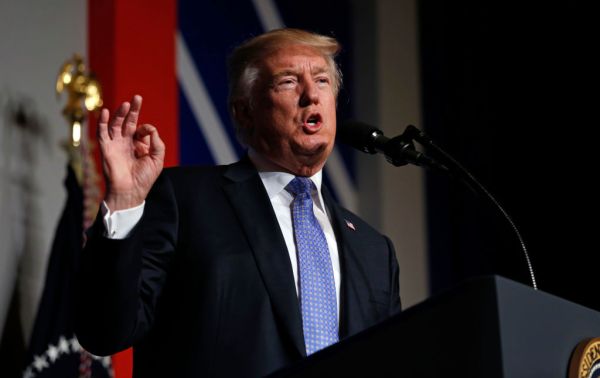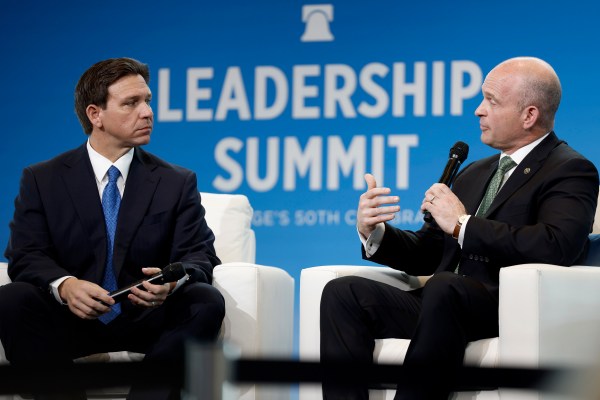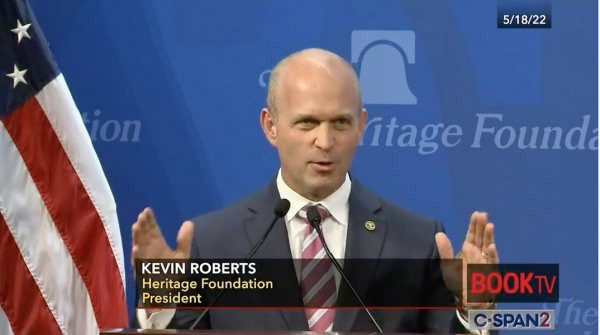The giant poster on the side of the Heritage Foundation’s eight-story Capitol Hill headquarters is impossible to miss. Underneath the think tank’s bell logo and the phrase “Congratulations, President Trump,” the now-iconic photograph of Donald Trump raising his fist in the air moments after a bullet nearly killed him looks out defiantly toward Union Station and Massachusetts Avenue.
But let’s say you did miss it. Helpfully, the Heritage Foundation’s social media accounts promoted a slickly produced video featuring the giant poster as it greeted those attending the organization’s inauguration weekend open house. “It’s time to celebrate,” read the post on X.
And why shouldn’t Heritage celebrate? Trump’s reascension to the White House is a validation of the 50-plus-year-old conservative think tank’s recent embrace of nationalism, populism, and political access. Where Heritage once used its power and intellectual force to shape Republican policy in a more classically conservative direction toward tax cuts, social conservatism, and a muscular national defense—what one might call Reaganism—during the Trump era the organization has radically rebranded. What was once an unabashedly conservative but still independent policy shop is now effectively a reactionary arm of Trump’s operations.
“We look forward to this historic term, during which President Trump has an opportunity to make America great, healthy, safe, and prosperous once again,” said Heritage Foundation President Kevin Roberts in a statement following the November election. “The entire conservative movement stands united behind him.”
Heritage is already doing plenty to boost the new administration, from its $1 million ad campaign to promote Trump’s Cabinet nominees to its over-the-top praise of the president’s executive actions. Among the ads released is a 30-second spot touting Health and Human Services secretary nominee Robert F. Kennedy Jr.’s record of “taking on big corporations and big government.” (And even taking on the Heritage Foundation, which Kennedy once described as one of many “snake pits of sociopaths” supported by the tobacco industry.) Another ad praises Tulsi Gabbard, the former Democratic congresswoman who is Trump’s nominee for director of National Intelligence. The ad does not mention Gabbard’s lifetime rating of 10 percent on Heritage Action’s congressional scorecard. It also does not mention her meeting with the now-former Syrian leader Bashar al-Assad in 2017, whose regime Heritage described at the time as a “brutal dictatorship.”
Prominent conservatives, such as radio host Erick Erickson, have criticized Heritage for backing someone like Kennedy, whom Erickson described as “pro-abortion and pro-government-funded national healthcare.”
Heritage is also cheerleading practically all of Trump’s initial executive actions, including his blanket pardon for all those convicted or charged with crimes related to the January 6, 2021, riot at the Capitol.
“President Trump’s decision to pardon nearly all January 6 defendants is a necessary corrective to the brazen weaponization of our justice system by the Left,” said Roberts in a statement this week. “The Democrats turned January 6 into a political cudgel, using it to distract from their disastrous policies and to smear their opponents.” It’s a far cry from how Roberts’ predecessor, Kay Coles James, described the mob as a “band of criminals” who “should be prosecuted to the fullest extent of the law” in an op-ed published one day after the riot.
That disparity between Coles James and Roberts tells much of the story of Heritage’s shift since Roberts took over as president of both the Heritage Foundation and its advocacy arm, Heritage Action, in 2021 after a shaky eight-year period for the think tank’s leadership.
Former Sen. Jim DeMint had taken over Heritage in 2013 with a mandate to make the institution more directly engaged with day-to-day politics on Capitol Hill and within the Republican Party. But four years later, the board fired DeMint for what it claimed was mismanagement and brought back its co-founder and longtime former President Ed Feulner to head the organization. Feulner’s second tenure was a short-lived bridge to Coles James, who took over at the beginning of 2018 in the middle of Trump’s first administration. This leadership succession after DeMint was seen internally as a recommitment to Heritage’s policy-focused, well, heritage.
But Heritage had also faced external critics, including one with a massive megaphone: Tucker Carlson. Heritage and Coles James were frequent targets of Carlson’s monologues on his Fox News program, examples of how the institutional conservative movement had lost its way. “You may have sent them money, hopefully for the last time,” Carlson said during one such monologue in which he criticized Coles James (who is black) for writing an op-ed denouncing the death of George Floyd in 2020 and calling for an end to racism.
Heritage’s broad base of financial support from conservative Americans across the country—many of whom were loyal viewers of Carlson’s show—was under threat. Coles James had initially said she would serve between three and five years as Heritage’s president, and by March 2021 she announced her intention to resign. That gave the Heritage board an opportunity to find new, long-term leadership. Enter Kevin Roberts.
According to people familiar with his selection, Roberts’ pitch to the board was that his background as president of the conservative Texas Public Policy Foundation would help him marry the populist tendencies animating the Republican Party with the conservative principles that guided places like Heritage. In his first address to the institution in December 2021, Roberts stated he wanted Heritage “not only to help recohere the conservative movement at this really important time, but also to set a positive vision for America.” At this “really important time,” not quite a year removed from Trump’s failed efforts to overturn the results of the 2020 election and stay in office, it was unclear whether the former president could or would remain in politics. Roberts seemed to be positioning Heritage for a post-Trump conservative future that nevertheless incorporated the populist energy the then-former president brought into the fold.
Not long after Roberts’ succession to the presidency of Heritage, he began to abandon the institution’s unspoken but longstanding “big tent” approach to conservatism in favor of an ideology that more closely aligned with Carlson’s and, yes, Trump’s.
Take American support for Ukraine in its war with Russia, a favorite bugaboo of Carlson’s. As the journalist David Montgomery noted, Roberts went from flying the Ukrainian flag above Heritage’s headquarters at the launch of Russia’s war in February 2022 to declaring 18 months later that Heritage was opposed to additional aid to Ukraine. In between, in April 2023, Carlson had been terminated from Fox News. His final speech before his firing from the cable-news behemoth was at—where else?—the Heritage Foundation, in celebration of the institution’s 50th anniversary.
By October 2023, Roberts was calling himself a “recovering neocon” and speaking at the annual gala for The American Conservative, the magazine founded by Trump’s ideological forerunner, Pat Buchanan. “The globalist, ideological hubris that overtook the Washington Republican establishment at the end of the Cold War—and still dominates elite institutions today—was wrong from the beginning,” Roberts said. “It was never strategically sound. It was never recognizably conservative. It never won a mandate from the American people. And it never overcame its inexcusable blind spot for—and indifference to—the struggles besetting working American families.”
All that was left was for Roberts and Heritage to grab Trump in a bear hug and hold on, but he committed two strategic mistakes. First, Roberts allied himself not with Trump but with Florida Gov. Ron DeSantis at the beginning of the presidential primary cycle. Second, Roberts and Heritage created and promoted Project 2025, the long list of policy proposals that became fodder for Democratic attack ads and campaign speeches, as a playbook for a future Trump administration.
Never mind that Trump had years earlier praised Heritage for its development of what would become Project 2025. By last summer, the Republican nominee distanced himself from the project and was reportedly furious at Roberts for saddling his campaign with a list of proposals he didn’t end up endorsing. The effort to reintegrate Heritage within Trump’s orbit has continued ever since—hence the “Dear Leader” poster.
It’s remarkable that Heritage has found itself chasing after a Republican president. The institution was the brainchild of conservative activists dismayed by how the domestic policy of another Republican president to whom Trump is often compared, Richard Nixon, had taken a leftward turn through his embrace of wage and price controls and some elements of the Great Society social-welfare programs. The nascent conservative movement had its journal (National Review) and its political north star (Ronald Reagan), and now it had a home for pro-market, anti-Communist, and socially conservative policymakers.
Heritage may have reached its high-water mark of influence during the Reagan administration, but it remained an important force afterward because of its generation of ideas and strong connection to a still-powerful conservative movement. But with the MAGA movement’s rise shattering the old conservative consensus, there was seemingly nowhere for Heritage to go but Trump.







Please note that we at The Dispatch hold ourselves, our work, and our commenters to a higher standard than other places on the internet. We welcome comments that foster genuine debate or discussion—including comments critical of us or our work—but responses that include ad hominem attacks on fellow Dispatch members or are intended to stoke fear and anger may be moderated.
With your membership, you only have the ability to comment on The Morning Dispatch articles. Consider upgrading to join the conversation everywhere.